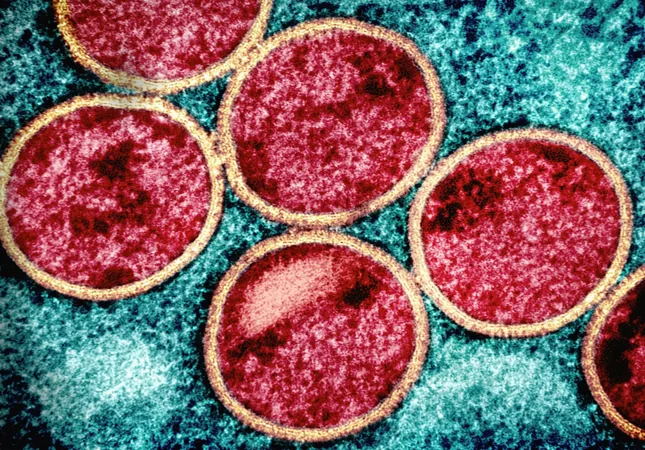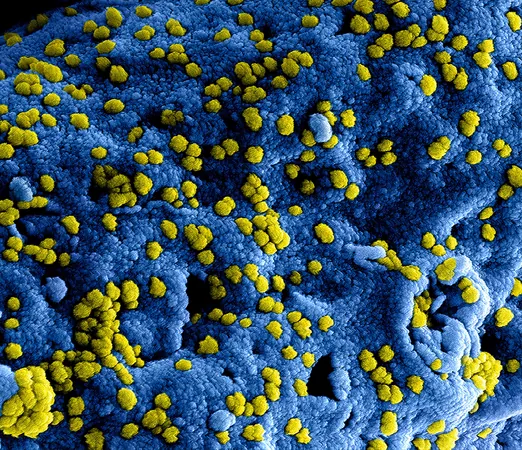
Alarming New Strain of Mpox Emerges in the U.S.: What You Need to Know!
2024-11-20
Author: Emily
The Emergence of Clade I Mpox
The United States is grappling with the emergence of a more contagious strain of mpox, previously known as monkeypox, as the Centers for Disease Control and Prevention (CDC) confirms its first case of clade I mpox. This diagnosis comes as a health advisory was issued encouraging healthcare professionals to remain vigilant for potential symptoms of this severe variant.
The California Department of Public Health first identified the case on November 15, linking it to recent travel from Eastern Africa. While the risk to the general population remains low according to the CDC, authorities are on alert following a global health emergency declared by the World Health Organization amid rising infection rates in Central and Eastern Africa.
What is Clade I Mpox?
Clade I represents a more contagious and severe form of mpox, historically causing higher rates of illness and mortality compared to the milder clade II. Despite initial concerns, recent data suggests that the ongoing outbreak might not escalate to the severity seen in previous incidents. Currently, about 3,000 mpox cases have been reported in the U.S. this year; clade II, less severe, was the dominant strain during the significant outbreak in 2022 which logged over 32,000 cases.
Symptoms and Transmission
Mpox spreads through intimate physical contact, including kissing, as well as through direct contact with infected rashes, bodily fluids, or contaminated objects like clothing. Symptoms typically include fever and painful rash-like lesions over a period of two to four weeks. Those infected should isolate until the rash fully heals, which can take considerable time.
Who is at Risk?
According to the CDC, individuals with weakened immune systems, very young children, pregnant women, and those with certain skin conditions are most vulnerable to severe infections. Men who have sex with multiple partners are also identified as a higher risk group, along with healthcare workers exposed to the virus.
Global Impact and Current Statistics
The current outbreak has affected not only the United States but has also registered over 100,000 global cases of clade II mpox this year alone. The WHO is poised to hold a meeting on November 22 to reassess the classification of mpox as a public health emergency of international concern, given its rapid global spread.
Vaccination and Prevention Strategies
Vaccination is strongly encouraged for those who may have been exposed or are at heightened risk. The primary vaccine in the U.S. is Jynneos, which requires two doses but is particularly suitable for individuals with compromised immune systems. Health officials stress hygiene measures, such as handwashing and avoiding intimate contact with infected individuals, as key preventative tactics.
Take Action!
Stay informed about developing health advisories. If traveling to regions where mpox is endemic, make sure to take necessary precautions, including vaccination and avoiding contact with potentially infected animals, such as rodents and primates.
With health authorities keeping a close eye on the situation, now is the time to understand your risk and protect yourself!









 Brasil (PT)
Brasil (PT)
 Canada (EN)
Canada (EN)
 Chile (ES)
Chile (ES)
 España (ES)
España (ES)
 France (FR)
France (FR)
 Hong Kong (EN)
Hong Kong (EN)
 Italia (IT)
Italia (IT)
 日本 (JA)
日本 (JA)
 Magyarország (HU)
Magyarország (HU)
 Norge (NO)
Norge (NO)
 Polska (PL)
Polska (PL)
 Schweiz (DE)
Schweiz (DE)
 Singapore (EN)
Singapore (EN)
 Sverige (SV)
Sverige (SV)
 Suomi (FI)
Suomi (FI)
 Türkiye (TR)
Türkiye (TR)